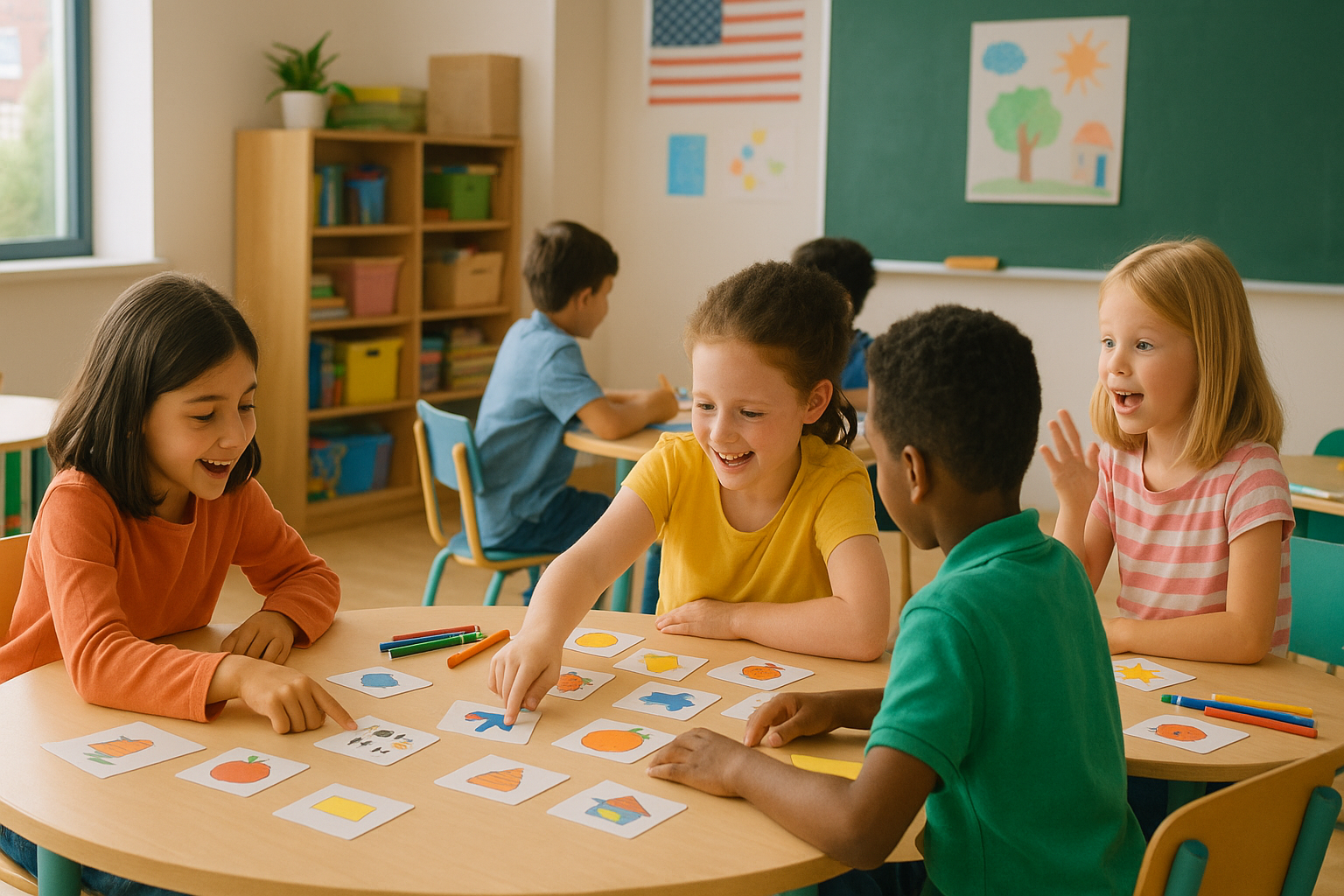Learning English in a playful environment. Primary school pupils and the acquisition of oral competence in English through cooperative learning
28/10/2025 | https://doi.org/10.63083/lamec.2025.60.llo
Oral competence, which translates into speaking and listening, is the cornerstone of foreign language learning. In the early stages of education, it is essential that children develop phonological awareness, acquire fluency and feel confident expressing themselves in another language. It is not about speaking perfectly, but about communicating effectively. However, although in many autonomous communities the educational curriculum already includes oral skills as a key part of English language skills, in practice, the classroom often focuses more on written grammar, leaving real oral interactions aside.
Therefore, we must now focus on teaching oral skills in English, and this can be achieved through fun, group-based English learning. In this sense, in many primary school classrooms, students work in teams, through cooperative learning, to learn the foreign language. This encourages them to share more with their classmates and learn the language through teamwork and cooperation. In this way, students do not just learn vocabulary or memorize grammatical structures, but use the English language to communicate, solve challenges or share ideas. Cooperative learning ensures that all students play an important role and learn by helping each other.
Cooperative learning and English language teaching
Cooperative learning is a teaching methodology based on students working together to achieve common goals. Unlike traditional group work, in cooperative learning each member has an individual responsibility and a collective commitment, which encourages the active participation of all students. This methodology is well known because it not only improves academic performance, but also boosts self-esteem and promotes skills such as empathy, active listening and conflict resolution. When English is learned cooperatively, the foreign language becomes a tool for cooperating, creating and playing, which makes students speak more, listen more and acquire the foreign language in a more meaningful way, while also enjoying the process. All of this encourages them to communicate, share and connect with their classmates. Through cooperation, students work together on real tasks and feel the need to learn the language in order to understand and communicate with each other. They begin to see the English language as a useful tool that allows them to interact, rather than as a subject they have to learn because it is simply part of the curriculum. By carrying out tasks with friends who are also learning, students feel more confident when interacting, are encouraged to speak more and gradually lose their fear of making mistakes.
The combination of cooperative learning and oral English skills work creates authentic communication contexts, where students not only practice a language, but also use it in a real context and with a clear purpose. Thus, students solve tasks, make decisions, teach their peers, among other things. This real communicative need creates an environment where English is used spontaneously and the fear of making mistakes is eliminated. Also, speaking in small groups makes students feel more confident than speaking in front of a whole class. This is especially important for students who are less confident in their language skills.
The English classroom: liveliness and teamwork
Learning English is a fundamental tool today, and as we have seen, it is not limited to writing well or reading, but encompasses communicating in the language and losing the fear of communicating. This is achieved when students practice from the earliest stages of education and do so in a real and dynamic context. In this sense, cooperative learning becomes important because its use for the development of oral skills not only improves students’ competence, but also allows them to learn in a lively educational environment, which transforms the classroom atmosphere. Thus, children not only learn English, but also use it to learn together, in an environment where collaboration, respect and creativity become pillars of everyday life. Ultimately, the goal is not to produce perfect speakers, but children who dare to communicate, who enjoy expressing themselves in another language and who understand learning as a shared process. And for that, there is no better path than the one travelled in company. Students learn in small groups, and in each group, each student has a specific responsibility and everyone works together to achieve a common goal. This ensures that no student is left behind and that everyone participates, listens, respects each other and learns together. On the other hand, students who work cooperatively develop more social skills, feel more confident and even improve their academic results.
Conclusion
In conclusion, with the world getting more globalized, knowing English has become a key skill from the early stages of education, and it’s not just about learning vocabulary or grammar, but knowing how to communicate effectively. In this context, cooperative learning emerges as an ideal methodology for enhancing oral English skills in primary school classrooms. Numerous studies have demonstrated the benefits of using cooperative learning in English language teaching, and more specifically in the acquisition of oral skills. Students are more motivated in the classroom and participate more in activities that are more dynamic and social. On the other hand, cooperative structures allow many students to speak simultaneously in groups rather than just one student at a time, which increases speaking time and, above all, improves the quality of the speech produced. Similarly, students feel less anxiety when communicating, improve their fluency and use of vocabulary, and learn to take turns, negotiate meanings, and value other forms of expression.
La Mecedora Divulga is licensed under CC BY-NC-ND 4.0

